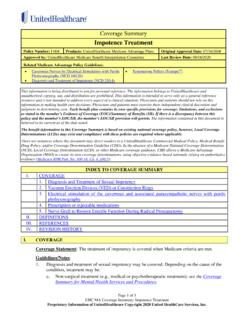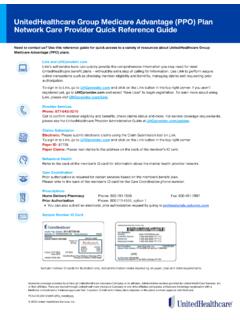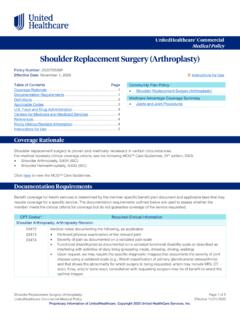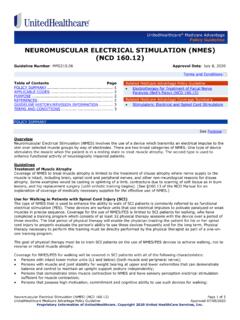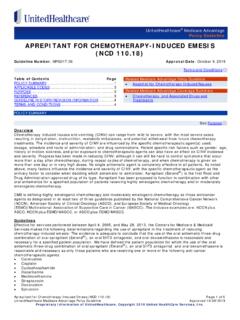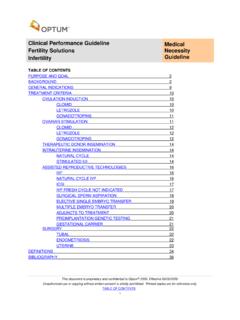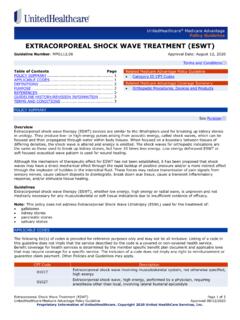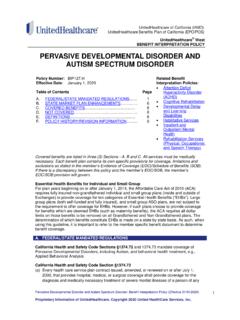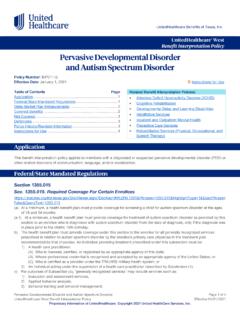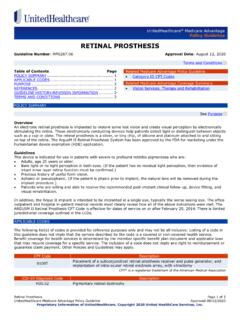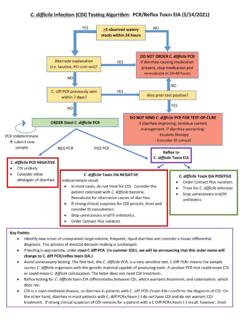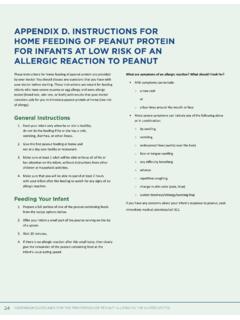Transcription of Gastrointestinal Pathogen Nucleic Acid Detection Panel ...
1 Gastrointestinal Pathogen Nucleic acid Detection Panel Testing for infectious diarrhea Page 1 of 11 UnitedHealthcare Commercial Medical Policy Effective 04/01/2022 Proprietary Information of UnitedHealthcare. Copyright 2022 United HealthCare Services, Inc. UnitedHealthcare Commercial Medica l Policy Gastrointestinal Pathogen Nucleic acid Detection Panel Testing for infectious diarrhea Policy Number: 2022T0604E Effective Date: April 1, 2022 Instructions for Use Table of Contents Page Coverage Rationale .. 1 Documentation Requirements .. 2 Applicable Codes .. 2 Description of Services .. 2 Clinical 3 Food and Drug 9 References.
2 9 Policy History/Revision Information .. 11 Instructions for 11 Coverage Rationale The following are proven and medically necessary: Multiplex polymerase chain reaction (PCR) Panel testing of Gastrointestinal pathogens of up to 5 targets when performed as part of an evaluation that includes blood cultures for an individual with any of the following: o diarrhea for more than 7 days with any of the following: fever; or bloody or mucoid stools; or severe abdominal cramping or tenderness; or signs of sepsis o Suspected enteric fever ( , typhoid or paratyphoid) in an individual with a history of recent travel to an endemic region ( , south-central Asia, Southeast Asia, and southern Africa) or who has consumed foods prepared by people with recent endemic exposure Multiplex PCR Panel testing of Gastrointestinal pathogens of up to 11 targets for the evaluation of persistent diarrhea in an individual with any of the following: o At risk for Clostridium difficile (C.)
3 Difficile) colitis and has had diarrhea for more than 7 days with any of the following: fever; or bloody or mucoid stools; or severe abdominal cramping or tenderness; or signs of sepsis o Acquired Immune Deficiency Syndrome (AIDS) o On immunosuppressive medications either following an organ transplant or when used for treatment of an auto-immune disease o Other condition causing immunosuppression and other stool diagnostic studies have failed to yield a pathogenic organism Due to insufficient evidence of efficacy, multiplex PCR Panel testing of Gastrointestinal pathogens is unproven and not medically necessary for evaluating all other indications not listed above as proven and medically necessary.
4 Community Plan Policy Gastrointestinal Pathogen Nucleic acid Detection Panel Testing for infectious diarrhea Gastrointestinal Pathogen Nucleic acid Detection Panel Testing for infectious diarrhea Page 2 of 11 UnitedHealthcare Commercial Medical Policy Effective 04/01/2022 Proprietary Information of UnitedHealthcare. Copyright 2022 United HealthCare Services, Inc. Documentation Requirements Benefit coverage for health services is determined by the member specific benefit plan document and applicable laws that may require coverage for a specific service. The documentation requirements outlined below are used to assess whether the member meets the clinical criteria for coverage but do not guarantee coverage of the service requested.
5 CPT Codes* Required Clinical Information Gastrointestinal Pathogen Nucleic acid Detection Panel Testing for infectious diarrhea 87505 87506 87507 Medical notes documenting all of the following: Current diagnosis History of illness and date of onset Co-morbidities Results of blood cultures and other lab tests Number of Pathogen targets being tested Physician treatment plan based on the results of Panel testing *For code descriptions, see the Applicable Codes section. Applicable Codes The following list(s) of procedure and/or diagnosis codes is provided for reference purposes only and may not be all inclusive.
6 Listing of a code in this policy does not imply that the service described by the code is a covered or non-covered health service. Benefit coverage for health services is determined by the member specific benefit plan document and applicable laws that may require coverage for a specific service. The inclusion of a code does not imply any right to reimbursement or guarantee claim payment. Other Policies and Guidelines may apply. CPT Code Description 87505 infectious agent Detection by Nucleic acid (DNA or RNA); Gastrointestinal Pathogen ( , Clostridium difficile, E. coli, Salmonella, Shigella, norovirus, Giardia), includes multiplex reverse transcription, when performed, and multiplex amplified probe technique, multiple types or subtypes, 3-5 targets 87506 infectious agent Detection by Nucleic acid (DNA or RNA); Gastrointestinal Pathogen ( , Clostridium difficile, E.)
7 Coli, Salmonella, Shigella, norovirus, Giardia), includes multiplex reverse transcription, when performed, and multiplex amplified probe technique, multiple types or subtypes, 6-11 targets 87507 infectious agent Detection by Nucleic acid (DNA or RNA); Gastrointestinal Pathogen ( , Clostridium difficile, E. coli, Salmonella, Shigella, norovirus, Giardia), includes multiplex reverse transcription, when performed, and multiplex amplified probe technique, multiple types or subtypes, 12-25 targets CPT is a registered trademark of the American Medical Association Description of Services A variety of viruses, bacteria, and parasites can cause Gastrointestinal (GI) infections.
8 Testing for parasites and viral etiologies for community-acquired diarrhea is not necessary since this type of diarrhea is generally self-limited, managed by supportive care and hydration, and virus specific therapy is not available to treat this condition. After bacteria pathogens are ruled out, travelers diarrhea with symptoms may require traditional ova and parasite stool examination and/or specific protozoa antigen or molecular testing. Traditional methods of diagnosis include bacterial culture, microscopy with and without special stains and immunofluorescence, and antigen testing. Culture-independent techniques have been developed that that use polymerase chain reaction (PCR) or real-time PCR and reverse-transcription PCR to amplify targets and detect the ribonucleic acid (RNA) or deoxyribonucleic acid (DNA) of potential pathogens .
9 In addition to single Pathogen diagnostic tests, Gastrointestinal (GI) Pathogen Nucleic acid Detection panels simultaneously test for the presence of multiple pathogenic microbes in a stool sample (Palavecino, 2015). Gastrointestinal Pathogen Nucleic acid Detection Panel Testing for infectious diarrhea Page 3 of 11 UnitedHealthcare Commercial Medical Policy Effective 04/01/2022 Proprietary Information of UnitedHealthcare. Copyright 2022 United HealthCare Services, Inc. Clinical Evidence Multiplex Polymerase Chain Reaction (PCR) Panel Testing In an effort to further investigate potential quality improvements in clinical management, use of antibiotics, and in-hospital infection transmission in children with acute diarrhea , Yoo et al.
10 (2021) analyzed use of the BioFire FilmArray Gastrointestinal Panel (GI Panel ) in a prospective study with a matched historical cohort. Participants in the prospective study included children younger than 19 years of age with new onset diarrhea . A 1:1 matched historical cohort of children diagnosed with acute gastroenteritis (AGE) during the 4 years prior to this investigation was analyzed as well. Children in the prospective cohort received stool testing using the GI Panel in addition to conventional methods. A total of 182 individuals with suspected infectious diarrhea were included in the prospective cohort. The median age was years and were male.
